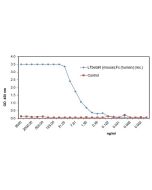Cookie Policy: This site uses cookies to improve your experience. You can find out more about our use of cookies in our Privacy Policy. By continuing to browse this site you agree to our use of cookies.
Chimerigen
LTβR (human):Fc (human) (rec.) (non-lytic)

| Product Details | |
|---|---|
| Synonyms | Lymphotoxin-beta Receptor; Tumor Necrosis Factor Receptor 2 Related Protein; Tumor Necrosis Factor C Receptor; Tumor Necrosis Factor Receptor Superfamily Member 3; TNFRSF3 |
| Product Type | Protein |
| Properties | |
| Source/Host | CHO cells |
| Sequence |
The extracellular domain of human LTβR (aa 31-225) is fused to the N-terminus of the Fc region of a mutant human IgG1. |
| Crossreactivity | Human |
| Biological Activity |
Shows the biological function of the LTβR moiety and exerts a prolonged circulating half-life caused by the modified Fc domain. |
| Purity | ≥98% (SDS-PAGE) |
| Endotoxin Content | <0.06EU/μg protein (LAL test; Lonza). |
| Reconstitution | Reconstitute at 100μg/ml in sterile PBS. |
| Formulation | Lyophilized from 0.2μm-filtered solution in PBS. |
| Protein Negative Control | |
| Other Product Data |
Non-lytic: Acts as a long lasting fusion protein which only binds to the receptor. Mutations to the complement (C1q) and FcgR I binding sites of the IgGs Fc fragment render the fusion proteins incapable of antibody directed cytotoxicity (ADCC) and complement directed cytotoxicity (CDC). |
| Declaration | Manufactured by Chimerigen. |
| Shipping and Handling | |
| Shipping | BLUE ICE |
| Short Term Storage | +4°C |
| Long Term Storage | -20°C |
| Handling Advice |
Avoid freeze/thaw cycles. Centrifuge lyophilized vial before opening and reconstitution. |
| Use/Stability |
Stable for at least 1 year after receipt when stored at -20°C. Working aliquots are stable for up to 3 months when stored at -20°C. |
| Documents | |
| Product Specification Sheet | |
| Datasheet |
 Download PDF Download PDF |
The LTβR activates two different NF-κB pathways that lead to distinct patterns of gene induction, including selected chemokines, and the cytokine BAFF, which is essential for the survival of mature B lymphocytes. LTβR activates the classical NF-κB (relA/p50) pathway, like the type 1 TNF receptor (TNFR1), that regulates proinflammatory genes, like the chemokine MIP1β. However, LTβR, unlike TNFR1, also activates the processing of p100 to form RelB/p52 complexes, which activate genes involved in lymphoid organ formation and lymphocyte survival.







